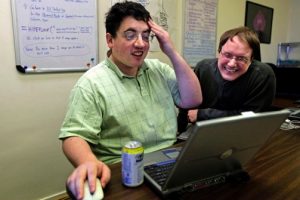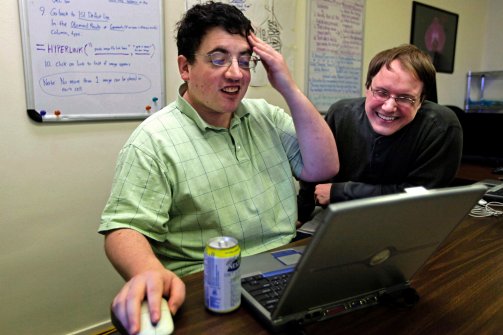A decade ago, Thorkil Sonne, a telecommunications executive living in Ringsted, Denmark, was terrified about what the future might hold for his seven year-old autistic son, Lars. But rather than give in to despair, the middle-aged father started a company Specialisterne (Specialists in Danish), which helps high-functioning adults with autistic spectrum disorders (ASDs) find employment. Today business is booming. Sonne oversees branches in a half-dozen European countries, including Germany, England, and Spain and is funneling workers to such IT giants as SAP. Now he is even moving to Delaware to establish a foothold in America.
Employees Oran Weitzberg (left), and Rick Alexander at Aspiritech, a nonprofit enterprise that specializes in finding software bugs, as they test a new program in Highland Park, Illinois, on Sept. 8, 2011. Aspiritech hires only people with autism disorders. (M. Spencer Green/AP)
This idea of integrating autistics into the workforce may be Danish Post-Modern, but it relies on a classic American formula. Giving quirky people the space to pursue their obsessions is precisely what has led to such iconic American inventions as The Declaration of Independence, Heinz Ketchup, and the iPhone. And if Sonne’s company can succeed here, then the nation may also be able to make significant headway in the next round of the civil rights struggle. This one isn’t about gender, race, creed or sexual orientation, but about brains that think differently.
While the 1% of the population with ASDs may have considerable difficulty navigating social interactions, they often possess superior intellectual aptitude for the so-called STEM fields—science, technology, engineering, and mathematics. Their ability to focus and to pay attention to detail can be otherworldly. “But their strengths aren’t just in repetitive tasks such as data analysis and quality control,” Sonne told me in a phone interview.
“They can also be innovators.” Muffling a laugh, Sonne explained that he once lost a lot of money because one of his Danish consultants finished a job that was supposed to take two months in just a couple of weeks. “He discovered a new solution to the problem,” added Sonne.
If you think autism and the workplace are an odd couple, think again. Silicon Valley is full of geniuses saddled (or blessed) with an analogous condition, obsessive-compulsive personality disorder (OCPD). OCPDers also are preoccupied with rules, lists, order, schedules, and cleanliness and tend to have difficulty connecting with others (though their interpersonal problems are somewhat less severe). Thirty years ago, when Apple was rolling out the first Macintosh computers in its Fremont factory, Steve Jobs donned white gloves to conduct frequent dust checks; whenever he spotted a few specks, he would instantly bark out orders to the plant manager to remove them.
Like many of Sonne’s employees, the young Thomas Jefferson had no trouble focusing incessantly on his work.
Obsessionality has powered far more than just the achievements of the current generation of tech titans. Like many of Sonne’s employees, the young Thomas Jefferson had no trouble focusing incessantly on his work; as a student at William and Mary, he often spent 15 hours a day reading and writing. This inveterate list-maker also loved minutiae; in his copious account books, he kept track of every cent he ever spent. Both his genius and his eccentricity are on full display in the Declaration of Independence. As opposed to his exquisitely crafted preamble, which has inspired generations of freedom fighters the world over, the often forgotten second part is a meandering list—a catalogue of King George III’s 27 crimes, which made even contemporaries such as John Adams squirm. The pure-food entrepreneur HJ Heinz, who turned ketchup into our national sauce at the dawn of the 20th century, was also an order and cleanliness nut. His spick-and-span plant in downtown Pittsburgh—a must-see tourist destination for decades—helped him establish his famous brand, the one which Warren Buffet has just snapped up for a cool $28 billion.
To make the corporate world more hospitable to those with ASDs, Sonne is asking companies to consider the world through their eyes and to be responsive to their concerns. For example, an autistic employee who is easily overwhelmed by noise can often be helped by being allowed to wear headphones. Sonne also cites the case of one autistic techie who didn’t understand the concept of sharing. After spotting free fruit in a kitchen, this fellow proceeded to take a whole bunch of bananas back to his desk. A potential crisis was averted when his boss explained that company rules stipulated that employees take only one piece of fruit at a time.
These micro-adjustments seem like a small price to pay for access to so much untapped brainpower. What’s more, Sonne’s efforts to bolster employer-employee bonding are may well have vast positive ripple effects. “The companies where our consultants thrive are generally good places to work,” he observe (http://www.thedailybeast.com/articles/2013/07/21/companies-discover-untapped-brain-power-autistics.html?utm_source=feedburner&utm_medium=feed&utm_campaign=Feed%3A+thedailybeast%2Farticles+%28The+Daily+Beast+-+Latest+Articles%29)



